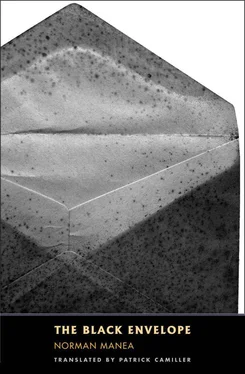“Shall I pour you another drop, Mr. — ?”
“Vancea. Anatol Vancea.”
Venera stood up, took the coffeepot from its place on the sideboard, and poured into the little cup.
“Anatol Vancea Voinov. My mother’s maiden name was Voinov, and she didn’t give it up, precisely because it had become suspect. They were a stubborn couple, clinging to their dignity — or so they thought.”
Venera also sipped her coffee. Tolea looked at her with friendly curiosity: it was difficult to refrain from asking whether she was not by any chance the sister of lame Veturia.
“You probably know Mr. Gafton.”
Venera did not answer, but took another leisurely sip. “The Gafton family. I’m a lodger with them — sort of. I mean, it’s not their apartment, but they took me in. They had a free room and offered it to me when I had to move to Bucharest. I haven’t told you yet, madam, but I was a schoolteacher until a few years ago. I taught foreign languages, especially Russian. I already knew some from my mother, and after the war it was easier for me to study Russian. But after that dirty trick — Excuse me, I haven’t had a chance to tell you about it. They pinned some stupid little things on me, out there in the provinces. Actually some well-staged exaggerations, in connection with my delicate relations — extremely delicate, I can tell you— with some teenage boys. Among whom I include myself, of course. They can sense it, the little devils; yes, our treacherous and wonderful little brothers can sense it. They can sense it, my splendid little good-for-nothings, yes, yes, they and I can sense it. So I couldn’t return to teaching. I was suspended. I also left town, of course: the provinces can’t tolerate rebels, you understand. The Gaftons, Mr. Matei and Mrs. Veturia, were very understanding, very welcoming.”
The hostess did not blink. She slowly sipped her coffee while looking at her guest.
“Now I work at a hotel in the center. At the Hotel Tranzit reception.”
There was a short long silence. The large bunch of red carnations brought by the professor shot up from the shell vase on the sideboard.
“So, at the Hotel Tranzit—”
The same long short silence went meandering on.
“Ah, please don’t get the idea — I know what’s said about people who work in hotels, in tourism. No, I haven’t given way there, believe me. I don’t like informers, you know. I’ve got other vices, but not that one.”
“Yes, yes, I understand,” murmured Venera.
“As I said, it was force of circumstance that brought me back to Bucharest. I got this pathetic job thanks to Gafton and the doctor, my friend the doctor. Solid people trained in the old style; maybe Tavi has spoken to you about them.”
Venera remained silent. Her small palm was stroking Tavi’s shiny back, stretched out beside her mauve slippers of tufted velvet. The dog did not stir when he heard the name that he shared with his absent master. He followed the chatterer’s confessions with perfect skepticism.
“Yes, he’s a beautiful dog. I don’t know if you know Veta — Veta Apostolescu, the scientific worker at the dogs’ clinic.”
The woman did not speak. She smiled, taken aback by the filial way in which the restless professor was looking at her, with a gentle incitement.
“Everyone, including the Association, speaks in the highest terms of Mrs. Apostolescu. She also looks after their dogs: she’s a member of the Association. An associate of the Association, as my friend Iopo, Daddy, put it. Maybe you know him. Haven’t you ever had any trouble with Tavi? Nowadays dogs also pose a lot of problems. When there’s no food or housing or medicine for humans, man’s best friend also suffers. And the laws — well, as you know, my dear lady, when the laws are made tougher for humans, dogs don’t do too well out of it either. You’ve probably heard the latest rumors that dogs are going to be cleared out of blocks of flats. So that working people can rest in peace and quiet, without being disturbed. And then there’s the pollution, the stress, the general decline of morals. That all affects our canine friends as well. And human wickedness, of course. And the general distrust and the cowardice and treachery and terror — all of it. But Tavi is pretty sturdy, no?”
“Yes, yes,” repeated Venera like an automaton.
“At our hotel, the Tranzit, we have a colleague, Vasilica, who’s a delightful woman. Generous, altruistic, religious. Well, we rather spoil Vili. She’s terribly fond of any old cur. I mean, any creature at all. Cats, rabbits, frogs, chickens, canaries, mice, anything.”
Colleague Vancea smiled at the memory of colleague Vili, and was about to ask the hostess whether she was not by any chance the sister of Vasilica Vasilic  . But it would have been out of place, an indiscretion, and he gave up the idea of satisfying his curiosity.
. But it would have been out of place, an indiscretion, and he gave up the idea of satisfying his curiosity.
“So, at the Hotel Tranzit. A receptionist — what’s there to be done? If it hadn’t been for Dr. Marga I wouldn’t even have found this job.
Nowadays the only people who can help you are the ones who work with the public and have contacts. Doctors, drivers, hairdressers, sellers of vegetables, meat, shoes, or petrol, and middlemen of every kind. Dr. Marga’s a real gentleman! Gafton, Marga, Tavi — they’re people from a different age, when my brother was also with them. Tavi has probably told you—”
The dog did not start, the hostess even less.
Then Tuesday of the following week. Tolea arrived dripping with perspiration, crumpled up, in really bad shape. He was late: the traffic had been brought to a standstill for several hours because the presidential convoy was due to take the Great Associate, the Jabberer, to or from the airport. He had only just managed to come in a roundabout way by taxi.
“Yes, yes, I understand,” maternal Venera calmed him.
As the initial interest waned, Tolea’s visits became ever more frequent and protracted. By now he was coming not only on Tuesday and Thursday but also on Saturday, and would have come every day if Venera had lived in the Cu  as’ house.
as’ house.
Virtuous Venera seemed overwhelmed and discomfited by the recollection of the past, and so the professor changed the subject. He began to supply details of everything that had happened on the days when they had not seen each other. He gave a lively account of the merry and guilty pranks at the Hotel Tranzit, explained how neighbor Gafton divided up the maintenance and lighting costs of the apartment, described Chick Gina and her dangerous temperament, reported the latest jokes about the Jabberer and his sovereign wife, and launched into shrewd remarks on the exponential rate at which rumors, jokes, and gossip spread through a country. Unofficial information, he said, can penetrate at an astounding exponential speed; it’s like with an earthquake, where the difference between 2 and 3 degrees on the Richter scale is less than that between 7.2 and 7.3 degrees. A fatal nuclear reaction, shock waves, and so on, explained the professor.
“Yes, yes, I understand,” the hostess agreed in a tone of resignation, now adjusting the tablecloth, now moving the vase with the customary flowers brought by the amiable professor. Tolea was already describing the mechanism of raising taxes through various fines — for traffic offenses, the leaving of rubbish outside the house, or the disturbance of public order — and then he moved straight on to the impossibility of an ecological movement in a country such as ours, to the virtues of space weapons, the manipulation of terrorism, manipulation in general, terrorism, and terror in general.
Читать дальше

 . But it would have been out of place, an indiscretion, and he gave up the idea of satisfying his curiosity.
. But it would have been out of place, an indiscretion, and he gave up the idea of satisfying his curiosity. as’ house.
as’ house.










